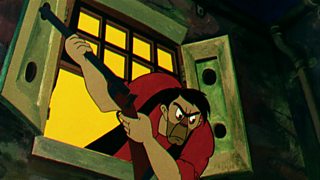In Shapter 4 of Animal Farm How Do the Animals Beat the Humans Again
Themes
A theme is an thought that runs throughout a text. In Animal Farm, the themes of form, equality and inequality, and power and control are explored.
Power and control in Animal Farm

Ability and command is one of the most of import themes in Creature Farm . Orwell explores political power - Mr Jones owns the subcontract and the animals and uses his men and whips to keep them under command and maintain his ability.
Orwell shows that the animals have the power to challenge Mr Jones' control and take over the farm - using power in a positive way. He and so explores how the pigs use rhetoric and propaganda to establish themselves in power and take control of the farm. It is interesting that the working animals, particularly Boxer the horse, have dandy concrete ability but they don't use it to break complimentary from the control of the pigs.
Onetime Major is partly based on Karl Marx and Vladimir Lenin. Karl Marx, was a German philosopher who lived during the 19th-century. His ideas formed the footing of communism - his ideas are collectively known as 'Marxism', like 'Animalism' in the novel. He adult theories on how ability structures in club keep people under control. Vladimir Lenin was a Russian revolutionary who established a course of 'Marxism' in Russian federation in the early 20th-century.
Orwell explores the idea of power leading to corruption. Many of the characters in the novel are eventually corrupted by the power they have, especially the pigs, as they manipulate their position of leadership to exploit other animals.
How is the theme of power and control shown in the novel?
In Beast Farm , Orwell explores power and control through:
- Mr Jones exploiting his power and treating the animals badly
- the rebellion and how the animals use their power to accept over the farm
- the pigs and how they cleverly command the other animals
| How does Orwell testify this? | Evidence | Analysis | |
|---|---|---|---|
| Mr Jones | Old Major teaches the animals a song called Beasts of England in response to Mr Jones treating them badly. The song is about animals overthrowing homo and being gratuitous. | Flake and spur shall rust forever, Brutal whips no more shall crack . | The animals sing about the devices Mr Jones uses to keep his power . The 'fleck and spur' and 'whips' are used to cruelly go on the animals nether control. |
| The rebellion | The animals fight back against the men and have control of the subcontract. | ...this sudden uprising of creatures whom they were used to thrashing and maltreating just equally they chose, frightened them virtually out of their wits . | The animals surprise the men with their 'sudden' change in behaviour - it frightens the men to see the animals using their power . |
| The pigs taking control | The pigs take charge and begin to control the other animals. Napoleon uses Grunter and the dogs to stop the animals' questions about the windmill. | Pig spoke and then persuasively, and the three dogs who happened to be with him growled and then threateningly, that they accustomed his caption without farther questions . | Between Squealer beingness so 'persuasive' and the dogs and then 'threatening' the pigs control the animals past preventing them questioning their decisions. |
Analysing the evidence
- Question
-
How does Orwell explore power and control in Animal Farm ?
-
- Mr Jones uses his power over the animals. It is suggested that Mr Jones uses physical violence to maintain control of the animals - they sing about the 'crack' of his whip in the song 'Beasts of England'.
- The animals use their own power to have control of the subcontract. They gang up on Mr Jones and his men and physically boot them off the farm.
- The pigs use the power of oral communication or rhetoric to maintain their control of the other animals.
- Napoleon uses fear to control the farm.
Source: https://www.bbc.co.uk/bitesize/guides/zw26hyc/revision/4
0 Response to "In Shapter 4 of Animal Farm How Do the Animals Beat the Humans Again"
Post a Comment